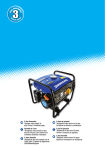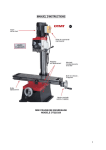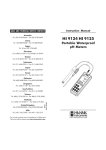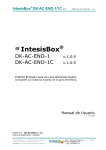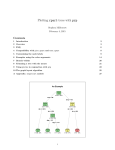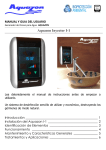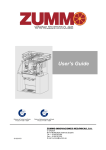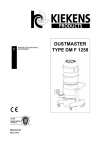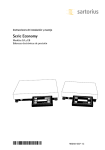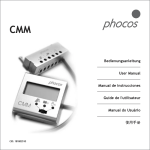Download GENERADORES DE OZONO GAMA DOMÉSTICA
Transcript
GENERADORES DE OZONO GAMA DOMÉSTICA 33556, 33557, 33558, 33559 y 33560 Manual de instalación y de mantenimiento Ref.: Ozone generator AstralPool-cast-R11 ÍNDICE PÁGINAS 1.- INTRODUCCIÓN ....................................................................................................................................... 3 2.- PRINCIPIO DE FUNCIONAMIENTO DE LA INSTALACIÓN..................................................................... 3 3.-PROCEDIMIENTO DE LA INSTALACIÓN DE OZONO ............................................................................. 4 - 6 4.-PROCEDIMIENTO DE LA INSTALACIÓN DE OZONO ............................................................................. 6 - 10 4.1 Generación de ozono........................................................................................................ 6 4.2 Componentes externos del ozonizador............................................................................. 6 - 7 4.3 Componentes externos del ozonizador............................................................................. 7 - 10 5.- INSTALACIÓN ELÉCTRICA DEL GENERADOR DE OZONO ................................................................. 11 6.- FUNCIONAMIENTO DE LA CÁMARA DESGASIFICADORA .................................................................. 11 - 13 7.- PUESTA EN MARCHA DE LA INSTALACIÓN: 7.1 Procedimiento habitual de puesta en marcha.................................................................. 13 7.2 Procedimiento habitual de parada completa.................................................................... 13 - 14 8.- MANTENIMIENTO DE LA INSTALACIÓN ............................................................................................... 14 - 15 9.- RECOMENDACIONES Y RECORDATORIO PARA UN BUEN USO DE LA INSTALACIÓN ................... 15 - 16 10.- PROBLEMAS MÁS FRECUENTES ........................................................................................................ 16 11.- ANÁLISIS DE FALLO Y SOLUCIONES DE SEGURIDAD ...................................................................... 17 12.- ANEXO A: ESQUEMAOZONIZACIÓN DE UNA PISCINA PRIVADA SIN CÁMARA ............................. 18 2 Ref.: Ozone generator AstralPool-cast-R11 1. INTRODUCCIÓN La depuración del agua de piscina, para garantizar las condiciones higiénicas, óptmas y de confort, requiere de varias operaciones básicas. Estas operaciones son la filtración, el bombeo, la dosificación de productos químicos y la ozonización del agua de la piscina. • Las especiales características del ozono hacen que sea muy interesante para los tratamientos del agua, debido a múltiples razones: • Disfruta de un gran poder oxidante que son aprovechadas para degradar, o bien eliminar ciertas sustancias orgánicas o inorgánicas no deseables. • Tiene un excelente poder bactericida y viricida. • Su gran poder desinfectante está poco influenciado por el pH del agua. • Hay una gran facilidad de obtención, ya que se produce en el mismo lugar de aplicación, sólo requiere de aire y de energía eléctrica. • No sólo no produce ningún subproducto peligroso sino que cuando se mezcla en el agua, se descompone en inofensivo oxígeno. Por todo ello, la aplicación del ozono es muy diversa, particularmente se utiliza en balnearios, piscinas de rehabilitación o en la industria alimentaria. También puede utilizarse en la eliminación de olores, en el proceso denominado desodorización (vestuarios, lavabos, cámaras frigoríficas, depuradoras, etc). 2. PRINCIPIO DE FUNCIONAMIENTO DE LA INSTALACIÓN DE OZONIZACIÓN El principio de funcionamiento de la instalación de ozono consiste en tratar una parte del caudal del agua filtrada mezclándola con aire ozonizado, con el objeto de conseguir una buena desinfección. Para conseguir una buena mezcla del aire ozonizado con el agua será necesario una bomba de presión y un venturi o inyector (ver figura 1). Fig. 1 Esquema del conjunto venturi 3 Ref.: Ozone generator AstralPool-cast-R11 3. PROCEDIMIENTO DE LA INSTALACIÓN DE OZONO En primer lugar debe crearse un “bypass”, instalando reducida o un collaríon de toma, después del último elemento que forma el equipo de depuración (filtración, intercambiador de calor si existiese). Mediante este “by-pass” aportaremos una porción del caudal de recirculación de la depuración del agua (ver figuras 2 y 3). El aporte de agua para la ozonización se efectúa mediante una bomba centrífuga de recirculación de media presión existiendo distintos modelos de generadores de ozono, tal y como se detalla en la tabla nº1. Modelo Generador ozono Modelo Bomba TRIOX R-SPAS TRIOX R-1 70/5 (07946) O,55 W 9,9 Kg TRIOX R-2 70/7 (07947) 0.75 W 11,5 Kg 120/7 (07948) 1.50 W 18,2 Kg TRIOX R-3 TRIOX R-4 Tipo de bomba Potencia Peso Posteriormente se hace pasar ese aporte de agua mediante la bomba a través de un venturi de 1” con el objeto de mezclar y disolver el aire ozonizado. Los diámetros de aspiración y de impulsión de las bombas C70/5, C120/7 y C/120/7 se reflejan en la tabla nº2. Modelo de bomba Diámetro de entrada Diámetro de salida 70/5 (07946) 1” 1” 70/7 (07947) 1¼” 1¼” 120/7 (07948) 1½” 1¼” Después de la bomba se instala otro “by-pass” (ver figuras 2 y 3) formado por el venturi construido totalmente en material de kynar, con unos pasos de rosca de 1”. Dispone también de una válvula de bola de diámetro 32 mm y un manómetro indicador de la presión de entrada al venturi. 2 La función de este último “by-pass” es la de conseguir una presión entre 3 ó 4 kg/cm jugando con la válvula de bola, situada a la salida de la impulsión de la bomba CM 70/5 (ver figura 4). La presión de entrada al venturi debe de alcanzar valores entre 3-4 bar para conseguir aspirar suficiente aire ozonizado y mezclarse con el agua que pasa a través del venturi. Una vez mezclado el agua con el aire ozonizado retornará al circuito general de depuración del agua de piscina. Entre el venturi y el ozonizador existe un sistema mecánico que garantiza el no retorno del agua al generador. Este sistema se denomina kit de seguridad antirretorno de agua (ver figura 5), está formado por una válvula antirretorno y una cazoleta o pequeño depósito donde se introduce agua hasta alcanzar el nivel marcado (unos 350 mm de columna de agua). El funcionamiento del kit se basa en las diferencias de densidades líquido/gas, evitando que cualquier retorno de agua proveniente del venturi no vaya directamente al ozonizador, sino que se desvíe a la cazoleta. La altura mínima entre la cazoleta y la Te debe de ser de unos 1700 mm. La salida de aire ozonizado “out” se conecta mediante un tubo de teflón de 6 x 8 mm al kit de seguridad y de ahí al venturi. 4 Ref.: Ozone generator AstralPool-cast-R11 FIG. 2 Esquema de instalación de ozonización sin cámara desgasificadora 1 5 7 3 4 40 20 60 80 230 V ac 6 2 1. 2. 3. 4. 5. 6. 7. FIG. 3 FILTRO DE ARENA BOMBA DE PRESIÓN VENTURI 1” MANÓMETRO 0-6 Bar PVC GLAS D32mm KIT DE SEGURIDAD GENERADOR DE OZONO Esquema de instalación de ozonización con cámara desgasificadora 1 12 11 13 14 5 8 6 14 3 230 V ac 40 4 20 60 80 13 5 7 2 1. 2. 3. 4. 5. 6. 7. FILTRO DE ARENA BOMBES DE PRESIÓN VENTURI MANÓMETRO PVC GLAS D32 PVC GLAS D20 SAFETY KIT 8. 9. 10. 11. 12. 13. 14. GENERADOR DE OZONO DESGASIFICADORA 9 FILTRO INCLINADO VÁLVULA DE PURGA 3/4” DESTRUCTOR DE AIRE OZONIZADO SECADOR DE AIRE CHECK VALVE 5 Ref.: Ozone generator AstralPool-cast-R11 Fig. 4 Esquema del conjunto by-pass venturi Fig. 5 Kit de seguridad antirretorno-trampa de agua 4. DESCRIPCIÓN DEL GENERADOR DE OZONO 4.1 Generación de ozono Para la generación de ozono es necesario una alimentación de aire u oxígeno al generador. El aire entrará al reactor de ozono donde se generará ozono a partir del oxígeno y de la diferencia de tensión que existe entre los electrodos del mismo. 4.2 Componentes externos del ozonizador (Ver figura 6) La llegada de tensión al equipo puede observarse por la iluminación verde del piloto (1E), situado en la parte superior central. Modelo TRIOX R-SPAS (33556): Si se pulsa el único interruptor ozone (2E), en posición de enclavamiento, se ilumina la bombilla verde del interior del pulsador, activando la bobina correspondiente del reactor de ozono. Modelo TRIOX R-1 (33557) Y TRIOX R-2 (33558): Si se pulsa cualquier interruptor ozone (2E), por ejemplo ozone-1 en posición de enclavamiento, se ilumina la bombilla verde del interior del pulsador, activando la bobina correspondiente del reactor de ozono. Si se pulsa el otro interruptor, ozone-2 en posición también de enclavamiento se ilumina la bombilla del interior del pulsador y se activa la segunda bobina, quedando en esta situación activadas las dos bobinas. Modelo TRIOX R-3 (33559): Si se pulsa cualquier interruptor ozone (2E), por ejemplo ozone-1 en posición de enclavamiento, se ilumina la bombilla verde del interior del pulsador, activando la placa de la bobina PB-1, correspondiente del reactor de ozono ROZ-3. Si se pulsa el otro interruptor, ozone-2 en posición también de enclavamiento se ilumina la bombilla del interior del pulsador y se activa la placa de la bobina PB-2 del reactor de ozono ROZ-4, quedando en esta situación activadas los dos conjuntos de bobinas PB-1 y PB-2. Modelo TRIOX R-4 (33560): Si se pulsa cualquier interruptor ozone (2E), por ejemplo ozone-1 en posición de enclavamiento, se ilumina la bombilla verde del interior del pulsador, activando la placa de la bobina PB-2, correspondiente al primer reactor de ozono ROZ-4. Si se pulsa el otro interruptor, ozone-2 en posición también de enclavamiento se ilumina la bombilla del interior del pulsador y se activa la placa de la bobina PB-2 del segundo reactor de ozono ROZ-4, quedando en esta situación activadas los dos conjuntos de bobinas PB-2. 6 Ref.: Ozone generator AstralPool-cast-R11 La entrada de aire (in) y salida de aire ozonizado (out) se sitúan en la parte inferior izquierda. La alimentación eléctrica se localiza en la parte inferior derecha del equipo (ver carátula del equipo (fig 7). Fig. 6 Esquema de la carátula del generador de ozono 4.3 Componentes internos del ozonizador (Ver figura 7A, 7B, 7C y 7D) El GENERADOR DE OZONO es un equipo de nueva generación pensado para poder ser resistente y de mantenimiento fácil. Está constituido por circuitos que gobiernan los medios transformadores (1I) o bobinas, caracterizado porque el conducto productor de ozono (2I) está constituido por un cuerpo tubular cerrado en material de PVC, el llamado Reactor de ozono (2I) (ver fig. 8A y 8B). OZONO-1/OZONO-2: El reactor (2I) está cerrado en sus extremos por sendos cabezales, a modo de tapones, de los cuales uno de ellos está solidariamente fijado a dos pares de lámparas productoras de ozono, cuyos electrodos están conectados a sus respectivos bornes que atraviesan la correspondiente base del cabezal. Las bobinas productoras de media tensión (1I) están conectadas a los bornes de los electrodos y a un circuito electrónico y eléctrico que constituye el control de cada bobina separada del cabezal del reactor de ozono por una placa de circuito electrónico (3I). OZONO-3/OZONO-4: Los reactores (2I) están cerrados en sus extremos por sendos cabezales, a modo de tapones, de los cuales uno de ellos está solidariamente fijado a dos pares de lámparas productoras de ozono, cuyos electrodos están conectados a sus respectivos bornes que atraviesan la correspondiente base del cabezal. Las bobinas productoras de media tensión (1I) están conectadas a los bornes de los electrodos y a un circuito electrónico y eléctrico que constituye el control de cada bobina separada del cabezal del reactor de ozono por una placa de circuito electrónico (3I). El aire aspirado por el venturi se ozoniza previamente al pasar por el ozonizador. En el interior del ozonizador se producen unas descargas eléctricas en forma de corona entre los dos electrodos. Parte del oxígeno se transforma en ozono. Al mezclarse este aire ozonizado con el agua mediante el venturi se producirá la desinfección. 7 Ref.: Ozone generator AstralPool-cast-R11 Fig. 7A Esquema del interior del equipo generador de TRIOX R-SPAS Y TRIOX R-1 Placa bobina PB - 1S para TRIOX R-SPAS Placa bobina PB - 1 para TRIOX R-1 BOBINA BO - 1 1I TRAFO SEPARADOR DE TENSION 100 V A VENTILADOR PLACA POWER 3-A SPAS PARA TRIOX R-SPAS, 1 sola línia de componentes electrónicos REACTOR DE OZONO PARA TRIOX R-SPAS ROZ - 2 2I PLACA POWER 3-A PARA TRIOX R-1, 2 línias de componentes REACTOR DE OZONO PARA TRIOX R-1 ROZ - 3 2I REGLETA DE ALIMENTACION ELECTRICA Fig. 7Bb Esquema del interior del equipo generador de ozono, TRIOX R-2 BOBINA B-4000202 VENTILADOR PLACA BOBINAS PB-2 SEPARADOR DE TENSIÓN 110 VA PLACA POWER 3-B REACTOR DE OZONO ROZ-4 REGLETA DE ALIMENTACIÓN ELÉCTRICA OUT IN 8 Ref.: Ozone generator AstralPool-cast-R11 Fig. 7C B Esquema del interior del equipo generador de ozono, TRIOX R-3 BOBINA BO-2 VENTILADOR PLACA BOBINAS PB-2 TTRANSFORMADOR 100 VA BOBINAL BO-1 PLACA BOBINAST PB-1 TRANSFORMADOR 160 V A PLACA POWER 3B REACTOR DE OZONO ROZ-4 REACTOR DE OZONO ROZ-3 IN OUT ENTRADA DE CORRIENTE MONOFÁSICA 230v AC 50 Hz Fig. 7DB Esquema del interior del equipo generador de ozono, TRIOX R-4 PLACA BOBINAS PB-2 BOBINA BO-2 PLACA BOBINAS PB - 2 VENTILADOR SEPARADOR DE TENSIÓN 60 V A SEPARADOR DE TENSIÓN160 V A PLACA POWER-3B RECATOR DE OZON ROZ - 4 OUT REACTOR DE OZONO ROZ - 4 IN ENTRADA CORRIENTE MONOFÁSICA 230 V AC 50Hz 9 Ref.: Ozone generator AstralPool-cast-R11 Fig. 8A1 Esquema de un reactor de ozono ROZ-2 Fig. 9A1 Esquema dela placa de bobina completa PB-1 SPAS Bob ina BO -48000201 Sep arad or Hexag onal M3x10 Circuito Imp reso P B-1 Dieléctrico SALIDA DE L AIRE O ZO NIZADO (PARTE P O STE RIO R) Bobina BO - 1 Ref. 48000201 E lectrod o interno Malla inoxid ab le AISI 316 E lectrodo interno Malla inoxidable AISI 316 E NTRADA DE L AIRE Tornillo inoxid ab le M6x25 DIN963 Fig. 8A Esquema de un reactor de ozono ROZ-2 Y ROZ-3 1 Fig. 9A Esquema dela placa de bobina completa PB- Bob ina BO -48000201 Sep arad or Hexag onal M3x10 Dieléctrico Circuito Imp reso P B-1 SALIDA DE L AIRE O ZO NIZADO (PARTE P O STERIO R) Bobina BO - 1 Ref. 48000201 E lectrod o interno Malla inoxid ab le AISI 316 E lectrodo interno Malla inoxidable AISI 316 E NTRADA DE L AIRE Tornillo inoxid ab le M6x25 DIN963 10 Ref.: Ozone generator AstralPool-cast-R11 Fig. 8B Esquema de un reactor de ozono ROZ-4 Fig. 9B Esquema dela placa de bobina completa PB-2 BOBINA BO-2 SEPARADOR HEXAGONAL M3X10 PLACA DE BOBINAS PB-2 DIELÉCTRICO SALIDA DE AIRE OZONIZADO B OBINA B O-2 ELECTRODO INTERNO MALLA INOXIDABLE AISI-316 ELECTRODO EXTERNO MALLA INOXIDABLE AISI-316 ENTRADA DE AIRE TORNILLO INOXIDABLE M6X25 DIN963 5. INSTALACIÓN ELÉCTRICA DEL GENERADOR DE OZONO La instalación eléctrica de todos los elementos eléctricos que intervienen en la ozonización es según el esquema que se adjunta (Ver figura 11) donde existe un armario eléctrico principal de la depuración de la piscina (bomba de depuración, luces, etc) y una ampliación del cuadro debido a la nueva incorporación de la ozonización. Fig. 10 Esquema eléctrico de instalación 11 Ref.: Ozone generator AstralPool-cast-R11 Este cuadro debe estar en un lugar seco y ventilado, resguardado de las inclemencias del tiempo, en el cuarto de máquinas. A este cuadro se le deberá añadir un interruptor magnetotérmico para la bomba de presión (TRIOX R-SPAS Y TRIOX R-1: C 70/5; TRIOX R- 2/TRIOX R-3: C 70/7; TRIOX R-4: C 120/7) y el ozonizador y un contactor protector de dicha bomba. El funcionamiento eléctrico debe conseguir el funcionamiento de los distintos elementos de la siguiente forma: 1º Funcionará la bomba de depuración ya existente de la piscina. 2º Funcionará la bomba de presión (TRIOX R-SPAS Y TRIOX R-1: C 70/5; TRIOX R- 2/TRIOX R-3: C 70/7; TRIOX R4: C 120/7 ), sólo si funciona la bomba de depuración. 3º Por último el ozonizador OZONO funcionará sólo si funcionan la bomba de depuración y la bomba de presión (TRIOX R-SPAS Y TRIOX R-1: C 70/5; TRIOX R- 2/TRIOX R-3: C 70/7; TRIOX R-4: C 120/7). Si sólo funciona una de las bombas, el OZONO no puede funcionar. 6. INSTALACIONES CON CÁMARA DESGASIFICADORA (OPCIONAL) Funcionamiento de la cámara desgasificadora 6.1 Fabricación La cámara está construida por medio de una preforma cilíndrica de fibra de vidrio y dos preformas para los fondos. En su interior, un molde hinchanble comprime la fibra de vidrio mientras es inyectada la resina de vinilester. 6.2 Propiedades químicas Presenta una alta resistencia a la corrosión, son insensibles al ataque del agua y de la mayoría de productos químicos (ozono incluido). La composición del material empleado (fibra de vidrio más resina vinilester) y el sistema de cerrado hacen que los depósitos resistan elevadas temperaturas, hasta los 75ºC. 6.3 Propiedades mecánicas 2 Gracias al sistema de fabricación, sin uniones, les confiere una excelente resistencia a la presión, hasta 10 kg/cm , y a los golpes de ariete. 6.4 Funcionamiento Esta cámara tiene dos funciones principales: • Eliminar las macroburbujas de aire ozonizado, denominada desgasificación. • Aumentar el contacto y la mezcla del aire ozonizado con el agua. La entrada de agua ozonizada se efectúa por la parte superior del depósito, es una entrada de 1” roscada en la tapa de PVC de 4”. La salida del agua se realiza por la parte inferior de la cámara. Durante este recorrido el agua ozonizada va perdiendo el aire ozonizado que se dirige a la parte alta de la cámara. Desde ese punto el aire ozonizado sale al exterior mediante una válvula de purga automática que sólo deja pasar el aire y no el agua (ver figura 11). Posteriormente este aire purgado se dirige al destructor de ozono siendo eliminado por la acción catalítica del carbón activo contenido en el destructor. La cámara desgasificadora presenta un tubo de nivel para conocer en todo momento que el sistema está funcionado correctamente. El tubo de nivel es de material plástico, PVC glass de D 20 mm y presenta 3 niveles. El primer nivel es el nivel OK, es el nivel óptimo de funcionamiento. El segundo nivel es el nivel de mantenimiento, es el nivel mínimo de trabajo de la instalación en el que permanece el agua dentro de la cámara cuando está funcionando continua-mente. Por último el tercer nivel es el nivel de alerta, llegado a este nivel es aconsejable que revisen la válvula de purga y el resto de accesorios puesto que este nivel es de advertencia del mal funcionamiento del sistema. 12 Ref.: Ozone generator AstralPool-cast-R11 Fig 11 Esquema de la cámara desgasificadora 6.5 Mantenimiento de la cámara desgasificadora Comprobar que hay una desgasificación observando los tubos de entrada y de salida de PVC glass D32 mm de la cámara desgasificadora; en el de entrada debe de aparecer una gran cantidad de macroburbujas, como resultado de la acción del venturi mezclando agua y aire ozonizado; en el de salida debe de aparecer agua exenta totalmente de macroburbujas, debe de observarse el tubo totalmente transparente. El carbón activo debe de cambiarse una vez al año. Limpiar regularmente el filtro (en función de la suciedad que se acumule) que está antes de la válvula de purga. Desmontar la válvula de purga y proceder a su limpieza una vez por temporada. Si fuese necesario, proceder al cambio de los componentes deteriorados, como por ejemplo las juntas. Mantener el nivel de agua de la cámara como mínimo en el 2º nivel, el nivel de mantenimiento. En caso de no poder mantenerlo revisar y comprobar que todos los elementos de la instalación estén en perfecto estado de funcionamiento. 7. PUESTA EN MARCHA DE LA INSTALACIÓN 7.1 Procedimiento habitual de la puesta en marcha 1. Abrir las válvulas de bola del “by-pass” general (Ver figura 2 ó 3 ). 2. Poner en marcha la bomba de presión C 70/5. 13 Ref.: Ozone generator AstralPool-cast-R11 TRIOX R-SPAS Y TRIOX R-1 70/5 (07946) TRIOX R-3 TRIOX R-2 TRIOX R-4 70/7 (07947) 120/7 (07948) 3. Ajustar paulatinamente la válvula del “by-pass”, donde está situado el venturi, hasta observar que el manómetro marque entre 3-4 bar (Ver figuras 2 y 3). 4. Abrir la válvula de abertura de aire ozonizado. 5. Observar la mezcla del aire con el agua del tubo de PVC glass transparente, de diámetro de 32 mm, determinando que el venturi aspira y funciona correctamente. 6. Comprobar que llega tensión al equipo-1 mediante el encendido del piloto verde indicador (2E) de la figura 7. 7. Comprobar que llega aire al equipo-1 aproximando la mano en la entrada (in) de aire. Asegurarse que las conexiones neumáticas del tubo de teflón con los racores específicos sean estancas. 8. Pulsar los interruptores del equipo generador de ozono, TRIOX, ozone-1 y ozone-2 en posición de enclavamiento. Seguidamente se observa el encendido de los pilotos correspondientes. Si se quiere trabajar al 100% de la producción dejar los dos pulsadores en posición de enclavamiento, y si sólo se quiere trabajar al 50% dejar un único pulsador en posición de enclavamiento. 7.2 Procedimiento de parada completa En caso de una parada prolongada de la depuración de la piscina (vacaciones, mantenimiento, reparación, etc.) se procederá a realizar los siguientes pasos: 1. Parar el equipo de OZONO mediante el desenclavamiento de los pulsadores o pulsador. En este paso los pilotos de los pulsadores dejan de encenderse. 2. Parar la bomba de presión (según modelo). TRIOX R-SPAS TRIOX R-1 70/5 (07946) TRIOX R-3 TRIOX R-2 TRIOX R-4 70/7 (07947) 120/7 (07948) 3. Cerrar la válvula en PVC de entrada de aire ozonizado al venturi. 4. Cerrar las válvulas de bola del “by-pass” general. NOTA IMPORTANTE: • Nunca se debe de manipular el equipo generador de ozono, cuando esté conectado. • Debe llamarse al servicio técnico más próximo cuando presente algún problema. • Siempre debe circular aire por el interior del reactor de ozono cuando el equipo esté en marcha. 14 Ref.: Ozone generator AstralPool-cast-R11 8. MANTENIMIENTO DE LA INSTALACIÓN • Revisar el buen funcionamiento de la válvula de bola de PVC del “by-pass” y de la válvula de bola de PVC de la entrada de aire ozonizado al venturi. • Revisar el venturi: revisar observando el tubo de PVC glass la aspiración de aire; revisar la válvula antirretorno de 1/2” , especialmente la bola de PVDF y el muelle de inoxidable deben estar limpios y sin ninguna impureza adherida. • Asegurarse de que no exista ninguna fuga de aire ozonizado en la instalación, sellándola convenientemente. El tubo de teflón debe de estar suficientemente sujeto al racor correspondiente. • Comprobar que no existe retorno de agua después del venturi, y del kit de seguridad, concretamente en la trampa de agua (ver figura 12). En caso contrario, purgar la instalación. Comprobar también que el kit de seguridad antirretorno funciona correctamente: El nivel mínimo de agua está marcado en la cazoleta y revisar la válvula antirretorno del venturi. • Revisar la bomba de presión, según modelo, según se indica en el manual de instrucciones de la misma. TRIOX R-SPAS TRIOX R-1 70/5 (07946) TRIOX R-3 TRIOX R-2 TRIOX R-4 70/7 (07947) 120/7 (07948) Fig. 5b Esquema del cto. venturi y del kit antirretorno 15 Ref.: Ozone generator AstralPool-cast-R11 8.1 Generador de ozono TRIOX • Comprobar eléctricamente que llega tensión al equipo. En este caso se ilumina el piloto 1E (Ver figura 6). • Comprobar que el ventilador de refrigeración funciona cuando funcionan los pulsadores de enclavamiento 2E (Ver figuras 6 y 7). • Comprobar el funcionamiento de los pilotos indicadores de producción. Estos deben iluminarse en verde al enclavar los pulsadores verdes, ozone-1, y ozone-2. • Comprobar que hay aspiración de aire, cuando el sistema esté en marcha, acercando la mano al racor de entrada de aire al equipo (in). • Comprobar que no ha entrado agua al equipo. Si así sucediera, desmontar el reactor de ozono y secar los diferentes elementos mediante un secador de aire o dejándolos en un lugar seco y ventilado durante unas horas hasta asegurarse de estar completamente secos. Para secar la humedad del armario y de todos los elementos pasar un paño por el interior del armario. 9. RECOMENDACIONES Y RECORDATORIO PARA UN BUEN USO DE LA INSTALACIÓN • El sistema venturi (inyector), tal y como se adjunta en la figura 1, dispone de una válvula antirretorno constituida por un muelle en acero inoxidable y una bola de teflón (PVDF). La función primordial de este sistema es evitar el retorno de agua al ozonizador. Es importante que se realice una revisión periódica de la válvula antirretorno, porque puede depositarse partículas que impidan su correcto funcionamiento. • Puede instalarse una válvula antirretorno después del sistema “by-pass” , con el fin de asegurar un antirretorno del agua hacia el equipo generador de ozono. El sistema dispone también de un manómetro (ver figura 4) para indicar la presión de trabajo, oscilando entre 3-4 bars de presión. • El equipo generador de ozono nunca debe manipularse cuando esté conectado, bajo ningún concepto. En caso de manipulación siempre el cliente debe contactar siempre con el servicio técnico autorizado más próximo. • El equipo generador de ozono debe funcionar sólo cuando funcionen la bomba de filtración y la bomba de presión (C 70/5, C 70/7 y C 120/7). Nunca debe funcionar cuando una o ambas estén paradas (posición OFF). • Debido a que el ozono es una molécula volátil, no tiene por tanto carácter residual remanente. Además el sistema de depuración de la piscina normalmente no funciona largos periodos al día. • En la piscina pública ES IMPRESCINDIBLE mantener en el agua, un residual pequeño de cloro o bromo, o utilizar el algicida ALGISAN. • En piscinas residenciales ES ACONSEJABLE mantener en el agua, un residual pequeño de cloro o bromo, o utilizar el algicida ALGISAN. • Cuando se realice la parada de la ozonización, siempre que se pueda y sobre todo en paradas largas, se aconseja como medida de seguridad cerrar la válvula de bola de PVC de entrada de aire ozonizado al venturi. • Revisar la bomba de presión (según modelo) según se indica el manual de instrucciones. Siempre debe instalarse, un contactor con su relé correspondiente, como medida eléctrica de seguridad y de trabajo. Las bombas C 70/5, C 70/7 y C 120/7 sólo pueden trabajar en agua dulce y no en agua de mar. Para trabajar en agua de mar deben de consultar con un servicio técnico autorizado que les informará sobre la versión para agua de mar. • Deben de seguir las guías técnicas de ASTRAL sobre los problemas del agua y los conceptos químicos fundamentales del agua (dureza, alcalinidad, algas, productos químicos, etc) para tener una visión más amplia del tratamiento del agua puesto que todo está muy interrelacionado. • Comprobar que el agua esté químicamente equilibrada, sobre todo en pH, alcalinidad. 16 Ref.: Ozone generator AstralPool-cast-R11 10. PROBLEMAS MÁS FRECUENTES Y SOLUCIONES • Cuando el tubo de PVC glas está coloreado puede ser debido a: • • • • No se enciende el piloto general, puede ser debido a: • que no esté en marcha el equipo; que no estén en posición de enclavamiento uno o los dos pulsadores; que las bobinas transformadoras (1I, fig.8 y 9 ) no funcionen; que algún componente eléctrico de la placa Power-3A (3I, fig. 8) se haya averiado; que el conjunto dieléctrico y electrodos (fig. 9) del reactor de ozono (2I) estén deteriorados. Si la bomba de presión no funciona, puede ser debido a: • • • • La bomba de filtración ni la bomba de presión no están en posición de marcha. Que se haya fundido la bombilla del piloto. No hay generación de ozono, puede ser debido a: • • • • • • A la ausencia de alimentación eléctrica al equipo. La bombilla del piloto esté fundida. No se enciende el piloto del pulsador al estar en posición de enclavamiento, puede ser debido a: • • • Una mala desinfección por no funcionar la ozonización. Por no existir un pequeño residual desinfectante (cloro o bromo). El pH del agua mal ajustado. que no llegue alimentación eléctrica a la bomba; que salte el relé térmico por sobreconsumo debido a un cruce u otro fallo similar; que el protector térmico se ha puesto en marcha debido a un sobreconsumo. No hay aspiración de aire del equipo GENERADOR DE OZONO, puede ser debido a: • • • • • • que no funciona la bomba de presión; que no hay suficiente presión a la entrada del venturi; que no hay agua en el kit de seguridad antirretorno (trampa de agua); que está cerrada la válvula de entrada de aire ozonizado al venturi; que está obstaculizada la válvula antirretorno del venturi; que no hay estanqueidad de la instalación neumática. 17 Ref.: Ozone generator AstralPool-cast-R11 10. ANÁLISIS DE FALLOS Y SOLUCIONES DE SEGURIDAD FALLO PELIGRO Los pulsadores no responden para detener el generador de ozono Ninguno: la bomba sigue funcionado Detener por el magnetotérmico. Avisar al Servicio Técnico. Falla la bomba Salta el térmico Desconexión del ozonizador por el protector térmico. SOLUCIÓN DE SEGURIDAD Fallo de la bomba y no salta el térmico. A: Sale muy poco O 3, por la admisión del ozonizador. Saturación 20 g/m³ de O 3 B: Entrada de agua en el reactor que provoca cortocircuito En cuartos ventilados, con entrada y salida de aire, el posible pequeño escape por corrientes de aire se autodestruye antes de conseguir la concentración máxima permitida. Saltan los fusibles del ozonizador y éste se detiene. El posible pequeño escape por corrientes de aire se autodestruye antes de conseguir la concentración máxima permitida. Cuartos ventilados con entrada y salida de aire. Rotura del circuito del agua sin O 3 Sale O3 por admisión del ozonizador. Nivel de saturación: 20 g/m³ de O3 Rotura del circuito de agua con O 3 No se detecta. Pérdidas deO3 + H2 O Circuitos hidráulicos: Montaje realizado por un instalador autorizado utilizando materiales normalizados de PVC. Fallo trampa de agua A: Se llena de agua, entrando hasta el reactor, provocando un cortocircuito. El cortocircuito provocauna parada del generador de ozono por su térmico o fusible. B: No hay agua: El ozononizador toma aire y no mezcla O 3; con lo que hay menos O 3 en el agua. Baja producción de O3 . Situación no peligrosa. Rotura del circuito de O 3 La expulsión directa del O3 a la atmósfera. Circuitos (tuberías) hidráulicas: Montaje del instalador autorizado utilizando materiales normalizados de PVC. Obstrucción/Gran resistencia en la salida del by-pass A) Sin cámara desgasificadora: Circuito cerrado H2O + O 3 t Baja densidad y no aspira: Saturación en el reactor. El posible pequeño escape por corrientes de aire se autodestruye antes de conseguir la concentración máxima permitida. Cuartos ventilados con entrada y salida de aire. B1) Con cámara desgasificadora: El agua no circula y no aspira. B2) Con cámara desgasificadora: El agua no circula y salta la bomba. El generador de ozono se detiene al pararse la bomba. Obturación del purgador automático de Aumento del nivel de gas en la cámara aire ( versión desgasificador) desgasificadora, hasta que sale agua ozonizada a mayor concentración. Se observan burbujas y olor a O3 . Contaminación de O 3 Mantenimiento: Revisión y limpieza periódicas del purgador. Agotado el CAG del filtro Contaminación de O 3 Mantenimiento:Reposición periódica de CGA. Obstrucción del venturi No aspira aire: mayor concetración de O3 . El posible pequeño escape por corrientes de aire se autodestruye antes de conseguir la concentración máxima permitida. Cuartos ventilados con entrada y salida de aire. Entrada de agua al reactor Provoca un cortocircuito. El cortocircuito provocauna parada del generador de ozono por su térmico o fusible. Falta agua La bomba se calienta y puede llegar a quemarse. Se dispara el térmico y detiene el generador de ozono. 18 Ref.: Ozone generator AstralPool-cast-R11 ANEXO A. ESQUEMA DE INSTALACIÓN DE UNA PISCINA PRIVADA 19 Ref.: Ozone generator AstralPool-cast-R11 OZONE GENERATOR DOMESTIC SCALE 33556, 33557, 33558, 33559, 33560 Installation and Maintenance Manual Ref.: Ozone generator-AstralPool-gb-R11 INDEX PAGES 1.- INTRODUCTION ....................................................................................................................................... 3 2.- PRINCIPE BEHIND AND OZONATION OPERATION ............................................................................. 3 3.- OZONE INSTALLATION PROCEDURE .................................................................................................. 4 - 6 4.- DESCRIPTIOM: OXSAN ZONE GENERATORS ...................................................................................... 7 - 11 4.1 ozone generator ..................................................................................................................... 7 4.2 external components of the ozone generator......................................................................... 7 4.3 internal components of the ozone generator.......................................................................... 8 -11 5.- ELECTRIC INSTALLATION OF THE OZONE GENERATOR ............................................................................................................................................ 11 - 12 6.- EQUIPMENT WITH OFF-GASSING CHAMBER (OPTIONAL) ................................................................ 12 - 14 6.1 Manufacture ........................................................................................................................... 12 6.2 Chemical Poperties ................................................................................................................ 12 6.3 Mechanical Properties............................................................................................................ 12 6.4 Operation ............................................................................................................................... 12 - 13 6.5 Maitenance of the off-gassing chamber ................................................................................ 14 7.- EQUIPMENT START-UP........................................................................................................................... 14 - 15 7.1 Normal running time............................................................................................................... 14 7.2 Complete shutdown procedure .............................................................................................. 15 8.- EQUIPMENT MAINTENANCE ................................................................................................................. 15 - 16 8.1 Ozone Generator ................................................................................................................... 16 9. RECOMMENDATIONS AND CHECKLIST FOR PROPER USE OF THE EQUIPMENT ...................................................................................................... 17 10. BASIC TROUBLESHOOTING AND SOLUTIONS ................................................................................... 17 11. FAULT TROUBLESHOOTING WITH SAFE SOLUTIONS .................................................................... 19 12. APPENDIX A. OUTLINE INSTALLATION OF A PRIVATE SWIMMING POOL ..................................... 20 2 Ref.: Ozone generator-AstralPool-gb-R11 1. INTRODUCTION Adequate treatment of pool water for peak hygiene and comfort involves several basic steps. These operations are essentially filtering, pumping, chemical dosing and ozonation of the pool water. Ozone is a unique molecule with special properties making it extremely useful in water treatment for a number of reasons: ▪ It is highly oxidizing, a property that can be utilized to degrade or eliminate certain unwanted organic or inorganic substances. ▪ It has excellent bactericidal and virucidal power. ▪ Its high disinfectant power is not affected by water pH. ▪ It is extremely easy to obtain, as it is produced on-site and requires only air and electrical power. ▪ It produces no hazardous byproduct, but simply decomposes in water to yield harmless oxygen. As a result, ozone has a wide variety of potential applications, with ozone generators used in public and private pools, spas and rehabilitation pools, as well as in the food industry. It can also be used to eliminate odors, a process known as air freshening (e.g., in dressing rooms, lavatories, cold rooms, purifier equipment, etc.). 2. PRINCIPLE BEHIND AN OZONATION OPERATION Ozone equipment works by treating part of the flow of filtered water and mixing it with ozonated air to achieve adequate disinfection. For proper mixing of ozonated air with water, a pressure pump and a venturi or injector will be needed (see Figure 1). FIG. 1 Venturi assembly inox spring Viton toric seal Teflon ball 8 mm elbow PVC 90º BSP female thread ½” (01734) Non-return Assembly ½" (07949R0003) Injector 1" (07949R0001) Hexagonal nipple PVC BSP male thread ½”(02112) Ball 1/2” PVC valve (02462) adaptor nipple PVC BSP female thread D 20 1/4" H (02246) Male adapter union PVDF 6-8 1/4” (01413R0200) 3 Ref.: Ozone generator-AstralPool-gb-R11 3. OZONE INSTALLATION PROCEDURE A bypass must first be created by installing a reducer tee or inlet ring after the last fitting in the water treatment equipment (e.g., filter, heat exchanger if any). This bypass is used to split off some of the recirculation water being treated (see Figures 2 and 3). The water used for ozonation is obtained via a medium-pressure recirculation centrifugal pump, with various models available for the various models ozone generators, as indicated in Table 1: Ozone Generator Model Pump Model Pump Type Power Weight O,75 W 9,9 Kg 70/7 (07947) 0.90 W 11,5 Kg 120/7 (07948) 1.10 W 18,2 Kg Ozone 70/5 GeneratorSpas, -1 (07946) (33556, 33557) Ozone Generator-2 33558) Ozone Generator-3 & 4 (33559, 335560) This water is then pumped through a 1” venturi to mix and disperse the ozonated air. The supply and return diameter of the 70/5 (07946), 70/7 (07947) and 120/7 (07948) pumps are listed in Table 2. Inlet Diameter Pump Model Outlet Diameter 70/5 (07946) 1” 1” 70/7 (07947) 1¼” 1¼” 120/7 (07948) 1½” 1¼” Another bypass (see Figures 2 and 3) is installed after the pump. This bypass is composed of a 100% Kynar venturi with a thread pitch of about 1”. It is also equipped with a ball valve of diameter 32 mm and a pressure gauge to indicate the inlet pressure for the venturi. 2 The function of the second bypass is to obtain a pressure of 3 to 4 kg/cm by playing with the ball valve, located at the outlet of the CM 70/5, CM 70/7 or CM 120/7 pump (see Figure 4). The inlet pressure for the venturi must be 3 to 4 bar, in order to take in sufficient ozonated air and mix it with the water flowing through the venturi. 4 Ref.: Ozone generator-AstralPool-gb-R11 Once the water is mixed with the ozonated air, it returns to the general circuit for treatment of the pool water. A mechanical system is positioned between the venturi and the Ozone Generator to ensure that water does not return to the ozone generator. This system is known as the check valve safety kit (see Figure 5), and is composed of a check valve and small cup which collects the water until it reaches the indicated level (about 350 mm of water gauge). The kit operating principle is based on the differences between the liquid-gas densities, which prevents any water from the venturi from flowing directly to the ozone generator by diverting it to the cup. The minimum height between the cup and the tee must be about 1,700 mm. The ozonated air outlet marked “out” is connected to the safety kit using 6*8 mm Teflon tubing, and from there to the venturi. FIG. 2 Ozonation equipment installation (without off-gassing chamber) 1 5 7 3 4 40 20 60 80 230 V ac 2 6 1. 2. 3. 4. 5. 6. 7. 5 SAND SILEX FILTER PRESSURE PUMP INJECTOR 1” PRESSURE GAUGE PIPE PVC GLASS D32mm SAFETY KIT, WATER TRAP OZONE GENERATOR Ref.: Ozone generator-AstralPool-gb-R11 FIG. 3 Ozonation equipment installation (with off-gassing chamber) 1 11 12 13 14 5 8 6 14 3 230 V ac 40 4 20 60 80 13 5 7 2 1. 2. 3. 4. 5. 6. SILEX SAND FILTER PRESSURE PUMP INJECTOR PRESSURE GAUGE PIPE PVC GLAS D32 PIPE PVC GLAS D20 FIG. 4 Venturi bypass assembly 8. 9. 10. 11. 12. 13. OZONE GENERATOR OFF-GASSING VESSEL FILTER 9 AIR RELEASE VALVE 3/4” OZONE GENERATOR AIR DRYER FIG. 5 Check valve safety kit. Water trap Check valve D32mm Sight Glass 300 mm D 32 Ball valve D 32 mm Injector 1” Pressure gauge Ball valve D 20 mm Male adaptor union D6x8-1/4” By Pass 6 Ref.: Ozone generator-AstralPool-gb-R11 4. DESCRIPTION OF THE OZONE GENERATOR MODELS 4.1. Ozone generation Ozone generation requires a source of air or oxygen. The air will enter the reactors, where ozone is generated from oxygen using the voltage difference existing between the electrodes. 4.2 External components of the ozone generator (see Figure 6) The green indicator (1E) at the top, in the middle, lights up when the equipment has power. Ozone Generator Triox-Spas (33556): model: When the ozone switch (2E), ozone1, is set, the green bulb inside the pushbutton lights up and the respective coil of the ozone reactor turns on. It has only one ozone switch. Ozone Generator Triox R-1 (33557) / Ozone Generator Triox R-2 (33558): When any ozone switch (2E), e.g., ozone1, is set, the green bulb inside the pushbutton lights up and the respective coil of the ozone reactor turns on. If the other switch, ozone2, is also set, the bulb inside the pushbutton lights up and the second coil is turned on, leaving both coil assemblies actuated. Ozone Generator Triox R-3 (33559): When any ozone switch (2E), e.g., ozone1, is set, the green bulb inside the pushbutton lights up and the respective coil plate for the first ozone reactor, ROZ 3, turns on. If the other switch, ozone2, is also set, the bulb inside the pushbutton lights up and the PB 2 coil plate of the ROZ 4 ozone reactor turns on, leaving both coil assemblies actuated. Ozone Generator Triox R-4 (33560):: When any ozone switch (2E), e.g., ozone1, is set, the green bulb inside the pushbutton lights up and the respective coil plate for the first ozone reactor, ROZ 4, turns on. If the other switch, ozone2, is also set, the bulb inside the pushbutton lights up and the PB 2 coil plate of the ROZ 4 ozone reactor turn on, leaving both coil assemblies actuated. The air inlet (in) and ozonated air outlet (out) are located at the bottom left. Power is supplied at the bottom right of the equipment. FIG. 6 Front panel of the Ozone Generator 7 Ref.: Ozone generator-AstralPool-gb-R11 4.3.: Internal components of the ozone generator (see Figure 7A, 7B, 7C and 7D) The Ozone Generator ozone generator is a state-of-the-art unit designed for sturdy operation and carefree maintenance. It is composed of circuits that govern the transformer units (1l), or coils, in which the ozone-producing duct (2l) consists of a closed PVC tubular body known as the ozone reactor (2l) (see Figures 8A and 8B). Ozone Generators Triox Spas/ Triox R-1/Triox R-2: The reactor (2l) is closed at the ends by identical heads similar to plugs, one of which is attached to two pairs of ozone-producing lamps that have electrodes connected to the respective terminals crossing the base of the head. The coils (1l), which produce medium-voltage, are connected to the electrode terminals and to an electronic and electrical circuit that controls each coil, separated from the ozone reactor head by an electronic circuit board (3l). Ozone Generators Triox R-3/Triox R-4:: The reactors (2l) are closed at the ends by identical heads similar to plugs, one of which is attached to two pairs of ozone-producing lamps that have electrodes connected to the respective terminals crossing the base of the head. The coils (1l), which produce medium-voltage, are connected to the electrode terminals and to an electronic and electrical circuit that controls each coil, separated from the ozone reactor head by an electronic circuit board (3I). The inlet air of the venturi is first ozonated as it goes through the ozone generator, where corona discharges take place between the two electrodes inside the ozone generator. Part of the oxygen is converted into ozone. Disinfection actually occurs when this ozonated air is mixed with the water. FIG. 7A Interior of the Ozone Generators Triox Spas and Triox R-1 equipment COIL BO - 1 1I COIL BOARD CIRCUIT PB - 1 TRIOX SPAS has only 1 coil, and RIOX R-1 has 2 coils. AIR BLOWER TENSION TTRANSFORMER SEPARATOR 100 V A BOARD CIRCUIT POWER 3-A SPAS version TRIOX SPAS has only 1 line OZONE REACTOR ROZ -2 version TRIOX SPAS BOARD CIRCUIT POWER 3-A version TRIOX R-1, has 2 lines OZONE REACTOR ROZ - 3 version TRIOX R-1 ELECTRIC FEEDING 8 Ref.: Ozone generator-AstralPool-gb-R11 FIG. 7B Interior of the Ozone Generator Triox R-2 equipment COIL BO-2 AIR BOWLER COIL BOARD CIRCUITPB-2 TENSION SEPARATOR TRANSFORMER 160 va BOARD CIRCUIT POWER 3-A OZONE REACTOR ROZ - 4 ELECTRIC FEEDING IN OUT FIG. 7C Interior of the Ozone Generator TRIOX R-3 equipment COIL BO-2 AIR BLOWER COIL BOARD CIRCUIT PB-2 TENSION SEPARATOR TRANSFORMER 100 VA COIL BO-1 COIL BOARD CIRCUITPB-1 TENSION SEPARATOR TRANSFORMER 160 V A PLACA POWER 3B OZONE REACTOR ROZ-4 OZONE REACTOR ROZ-3 IN OUT ELECTRIC FEEDING 230v AC 50 Hz 9 Ref.: Ozone generator-AstralPool-gb-R11 FIG. 7D Interior of the Ozone Generator TRIOX R-4 equipment COIL BOARD CIRCUIT PB - 2 COIL BO-2 COIL BOARD CIRCUIT PB - 2 AIR BLOWERR TENSION SEPARATOR TRANSFORMER 160 V A TENSION SEPARATOR TRANSFORMER 160 V A BOARD CIRCUIT 3B OZONE REACTOR ROZ - 4 OZONE REACTOR ROZ - 4 IN OUT ELECTRIC FEEDING 230 V AC 50Hz FIG. 8A ROZ 3 ozone reactor FIG. 9A Complete coil board, PB-1 COIL BO-1 M3x10 HEXAGONAL SPACER BOARD CIRCUITPB-1 OZONATED AIR OUTLET(REAR) DIELECTRIC COIL BO-1 INTERNAL AIS 316 STAINLESS MESH ELECTRODE EXTERNAL AIS 316 STAINLESS MESH ELECTRODE AIR INLET STAINLESS STEEL M6x25 DIN963 10 Ref.: Ozone generator-AstralPool-gb-R11 FIG. 8B ROZ 4 ozone reactor FIG. 9B Complete coil board, PB-2 COIL BO-2 BOARD CIRCUITPB-2 M3x10 HEXAGONAL SPACER DIELECTRIC OZONATED AIR OUTLET COIL BO-2 INTERNAL AISI 316 STAINLESS MESH ELECTRODE EXTERNAL AISI 316 STAINLESS MESH ELECTRODE AIR INLET STAINLESS STEEL M6X25 DIN963 5. ELECTRICAL INSTALLATION OF THE OZONE GENERATOR All electrical components involved in ozonation are installed as indicated on the attached diagram (see Figure 10), which includes a main electrical cabinet for pool treatment (treatment pump, lights, etc.) and an expanded board for ozonation equipment. FIG. 10 Ozone Generator internal wiring EQUIPMENTEXPANSION MAIN BOARD R S T N CONTROL OF MEDIUM SIZE POOL RT 2 K1 MT K1 K1 K2 K2 RT 2 K2 Generator Ozone RT 1 RT 1 y RT2 = TERMAL RELAYS MT = CIRCUIT BREAKER PUMP FILTRATION 11 PUMP Generator Ozone Ref.: Ozone generator-AstralPool-gb-R11 This board must be located in a dry, well-ventilated area that is protected from the weather in the machine room. A breaker switch must be added to this board for the pressure pump (Ozone Generators Spas/ Triox R-1: 70/5 (07946); Ozone Generator Triox R-2/Ozone Generator Triox R-3: 70/7 (07947): Ozone Generator Triox R-4 120/7 (07948)), as well as the ozone generator and a safety contactor for this pump. The electric operation must allow the various components to work as follows: 1 2 3 The existing water treatment pump will be running. The pressure pump will run (Ozone Generator Triox Spas/ Triox R-1: 70/5 (07946); Ozone Generator Triox R-2 /Ozone Generator Triox R-3: 70/7 (07947); Ozone Generator Triox R-4: 120/7 (07948)), only if the treatment pump is running. The OXSAN ozone generator will run only if the treatment pump and the pressure pump are running (Ozone Generator-1: CM 70/5 (07946); Ozone Generator Triox R-2/Ozone Generator Triox R-3: 70/7 (07947); Ozone Generator Triox R-4: 120/7 (07948)). If only one of the pumps is working, the Ozone Generator cannot run. 6. EQUIPMENT WITH OFF-GASSING CHAMBER (OPTIONAL) Operation of the off-gassing chamber 6.1 Manufacture The chamber is constructed of a cylindrical fiberglass preform and two preforms for the bases. Inside, an inflatable mold compresses the fiberglass while the vinyl ester resin is injected. 6.2. Chemical properties: The chamber is highly resistant to corrosion and unaffected by water or most chemicals (including ozone). The composition of the materials used (fiberglass plus vinyl ester resin) and the sealed design allow the tanks to resist temperatures as high as 75ºC. 6.3. Mechanical properties: 2 The seamless manufacturing system provides excellent pressure resistance up to 10 kg/cm , and to water hammer. 6.4. Operation: This chamber has two main functions: Eliminate large bubbles of ozonated air, a process known as off-gassing. Increase air-water contact and mixing. The ozonated water inlet is positioned at the top of the tank and consists of a 1” threaded inlet in the 4” PVC lid. The water outlet is located at the bottom of the chamber. As it streams downward, the ozonated water gradually loses ozonated air, which rises to the top of the chamber. 12 Ref.: Ozone generator-AstralPool-gb-R11 From this point the ozonated air exits the chamber through an automatic bleeder valve that allows only the air to flow through, but not the water (see Figure 11). This purged air then flows to the ozone destructor where it is eliminated by the catalytic effect of the activated charcoal in the destructor. The off-gassing chamber is equipped with a level tube for constant visualization of proper operation. The level tube is made of plastic (PVC glass) with a diameter of 20 mm and has three levels. The first level is the OK level, which is the optimal operating level. The second level is the maintenance level, which is the minimal working level of the equipment for the water in the chamber when it is running continuously. Lastly, the third level is the alert limit. When this level is reached, the bleeder valve and other fittings should be checked, as this level warns the user that the system is not working properly. FIG. 11 Off-gassing chamber Ozone destructor LEVEL PIPE PVC-GLASS D20 mm Pipe PVC-GLASS D 32 mm OFF-GASSING CHAMBER 13 Ref.: Ozone generator-AstralPool-gb-R11 6.5. Maintenance of the off-gassing chamber Check for off-gassing by inspecting all PVC glass (D32 mm) inlet and outlet tubes in the off-gassing chamber. In the inlet tube, there should be numerous large bubbles as the result of water-ozonated air mixing by the venturi. In the outlet tube, the water should have no large bubbles and the tube should be fully transparent. The activated charcoal must be changed once a year. Clean the filter (depending on the amount of accumulated dirt) located before the bleeder valve regularly. Dismount the bleeder valve and clean it once a season. If necessary, replace worn parts (e.g., gaskets). Keep the water level of the chamber at the second level (minimum), the maintenance level. If maintenance is not possible, inspect and check that all equipment components are in good working condition. 7. EQUIPMENT START-UP 7.1 Normal running time 1. Open the ball valves of the general bypass (see Figures 2 and 3). 2. Start the pressure pump for the model. Ozone Genetaror Triox Spas/ Triox R-1 70/5 (07946) Ozone Generator Triox R-2 70/7 (07947) Ozone Generator Triox R-3 Ozone Generator Triox R-4 120/7 (07948) 3. Gradually adjust the bypass valve where the venturi is located, until the pressure gauge indicates 3 to 4 bar (see Figures 2 and 3). 4. Open the ozonated air valve. 5. Observe the air-water mixing in the transparent PVC glass tube of diameter 32 mm, to check that the venturi is suctioning and working properly. 6. Check for voltage at the Ozone Generator equipment using the green indicator (2E) of Figure 7. 7. Check that air is reaching the Ozone Generator equipment by placing the hand near the air inlet (in). Check and make sure that the pneumatic connections of the Teflon tube with the fittings are airtight. 8. Set the Ozone Generator equipment switches, ozone1 and ozone2 (Triox Spas only 1 switch). The respective indicators should turn on immediately. For 100% duty, set both pushbuttons. For 50% duty, set only one pushbutton. 14 Ref.: Ozone generator-AstralPool-gb-R11 7.2 Complete shutdown procedure In the event of an extended shutdown of the pool treatment equipment (due to vacation, maintenance, repair, etc.), perform the following steps: 1. Stop the Ozone Generator ozone equipment by releasing the pushbutton(s). The pushbutton indicators will turn off. 2. Stop the pressure pump (depending on model). Ozone Genetarors Triox Spas/Triox R-1 70/5 (07946) Ozone Generator Triox R-2 70/7 (07947) Ozone Generator Triox R-3 Ozone Generator Triox R-4 120/7 (07948) 3. Close the PVC inlet valve for ozonated air to the venturi. 4. Close the ball valves of the general bypass. IMPORTANT NOTE: Never work on the Ozone Generator when it is connected. Call the nearest technical service in the event of any problem. When the equipment is running, air must be circulating inside the ozone reactor at all times. 8. EQUIPMENT MAINTENANCE Check that the PVC bypass ball valve and the PVC ball valve of the inlet for ozonated air to the venturi are working properly. Inspect the venturi: Air suction in the PVC glass tube Clear, impurity-free ½” check valve (particularly the PVDF ball and stainless steel spring) Make sure that there is no ozonated air leak in the equipment, sealing it if necessary. The Teflon tube must be properly secured to the respective fitting. Check that no water returns after the venturi and the safety kit, particularly in the water trap (see Figure 12). If otherwise, drain the equipment. In addition, check that the check valve safety kit is working properly: The minimum water level is marked in the cup; check the check valve of the venturi Check the circulation pump (depending on the model), as indicated in the instruction manual for the pump. Ozone Generator-3 Ozone Genetaror-1 Ozone Generator-2 Ozone Generator-4 70/5 (07946) 70/7 (07947) 15 120/7 (07948) Ref.: Ozone generator-AstralPool-gb-R11 FIG. 12 Venturi assembly and check valve kit Chec k valve D32 mm From Oxsan Ozonizer Pipe PVC Glass 300 mm D 32 Chec k valve D32 mm Injector 1” Water Level Water trap By Pass 8.1. Ozone generator Check for voltage in the equipment, using electrical instruments. In this case the 1E indicator lights up (see Figure 6) Check that the cooling fan is running when the 2E pushbuttons are set (see Figures 7A, 7B, 7C, 7D) Check that the generation indicators are working. These should light up green when the green pushbuttons (ozone1 and ozone2) are set. Check for air suction when the system is running by placing the hand near the air inlet to the equipment (in). Check that no water has entered the equipment. If so, dismount the ozone reactor and dry the various components using an air dryer or leaving them in a dry, well-ventilated area for several hours until completely dry. To dry moisture in the cabinet and from all components, wipe the inside of the cabinet with a cloth. 16 Ref.: Ozone generator-AstralPool-gb-R11 9. RECOMMENDATIONS AND CHECKLIST FOR PROPER USE OF THE EQUIPMENT The venturi system (injector), as shown in Figure 1, is equipped with a check valve comprised of a stainless steel spring and a Teflon (PVDF) ball. The principal function of this system is to prevent water from flowing back to the Ozone Generator. The check valve should be checked regularly, as particles can be deposited in the valve and prevent it from working properly. A check valve can be installed after the bypass system, in order to ensure that water does not flow toward the Ozone Generator equipment. The system is also equipped with a pressure gauge (see Figure 4) to indicate the working pressure, which should be 3-4 bar. No maintenance whatsoever should be done on the Ozone Generator equipment when it is connected. If maintenance is necessary, the customer must ALWAYS contact the nearest authorized technical service. The Ozone Generator equipment should ONLY be run when the filter pump and the pressure pump (70/5; 70/7 or 120/7) are running. It should never be operated when either one or both of these units are off (OFF position). Since ozone is a volatile molecule, it leaves no residue. In addition, the pool treatment system normally does not operate for long periods during the day. Public pools MUST keep a small amount of residual chloride or bromide in the water, or use algecide. Private pools SHOULD keep a small amount of residual chloride or bromide in the water, or use algecide. When the ozonation equipment is off (particularly for extended periods), the PVC ball valve for ozonated air inlet to the venturi should be closed as a safety measure. Check the pressure pump (depending on the model) as indicated in the instruction manual. A contactor must always be installed with the respective relay, as an electrical and operational safety measure. The 70/5, 70/7 and 120/5 pumps only work in fresh water and not in seawater. For seawater operation, please consult an authorized technical service. Please refer to the AstralPool technical guidelines on water problems and the basic chemical concepts of water (hardness, alkalinity, algae, chemicals, etc.) for an overview of water treatment, as all concepts are highly interrelated. Check that water is chemically balanced, particularly in terms of pH, alkalinity. 10. BASIC TROUBLESHOOTING AND SOLUTIONS Color in the PVC glass tubing may be due to: Disinfection is poor because the ozonation equipment is not running. There is no small disinfectant residual (chloride or bromide). The pH of the water is poorly adjusted. The general pilot does not turn on. No power is being supplied to the equipment. The indicator bulb is blown. 17 Ref.: Ozone generator-AstralPool-gb-R11 • The pushbutton indicator does not turn on when the pushbutton is set. • • • There is no ozone generation. • • • • • • The equipment is not running. One or both of the pushbuttons are not set. The transformer coils (1l) (Fig. 8A, 8B, 9A, 9B) do not work. One or more electrical components of the 3A POWER board (3L) or the 3B POWER board (3l) (Fig. 7A, 7B, 7C, 7D) is broken. The dielectric-electrode assembly (Fig. 8A, 8B) of the ozone reactor (2l) is damaged. The pressure pump does not work. • • • • The filter pump or pressure pump are not in the run position. The indicator bulb is blown. No power is being supplied to the pump. The thermal relay trips due to an overload caused by a short circuit or similar fault. The thermal protector has tripped due to an overload. There is no air suction in the Ozone Generator equipment. • • • • • • The pressure pump is not working. There is insufficient pressure at the venturi inlet. There is no water in the check valve safety kit (water trap). The inlet valve for ozonated air to the venturi is closed. The check valve of the venturi is clogged. The pneumatic equipment is not airtight. 18 Ref.: Ozone generator-AstralPool-gb-R11 11. FAULT TROUBLESHOOTING WITH SAFE SOLUTIONS FAULT HAZARD SAFE SOLUTION The push-buttons used to stop the Ozone Genera tor do not respond None: The pump c ontinues to operate Use the circuit breaker to stop the pump. Notify Technical Service. The pump is not running. The breaker switc h trips Use the breaker switch/thermal protector to turn the Ozone Generator unit off. The pump is not running, but the breaker has not tripped. A: Very little O3 comes out of the Oxsan inlet. Saturation level: 20 g/m³ of O3 In well-ventilated rooms with an air inlet and outlet, any small leak is automatically destroyed by air drafts before the maximum admissible concentration is reached. B: Water has entered the reactor, causing a short circuit. The Ozone Generator fuses trip and the equipment stops running. The water circuit not containing O3 is ruptured. O3 comes out of the Ozone Generator inlet. Saturation level: 20 g/m³ of O3 Any small leak is automatically destroyed by air drafts before the maximum admissible concentration is reached. Use well-ventilated rooms with air inlet and outlet. The water circuit containing O3 is ruptured. None detected. O3 + H 2O losses Hydraulic circuits: have an authorized installer mount the system using standard PVC materials. The water trap does not work. A: The trap fills with water up to the reactor, causing a short circuit. The short circuit causes the Ozone Generator to stop running due to a tripped breaker switch or blown fuse. B: There is no water: The Ozone Generator takes in air but does not mix O3;hence, there is less O3 in the water. Low O3 production. Non-hazardous situation. The O3 circuit is ruptured. O3 is expelled directly to the atmosphere. Hydraulic circuits (pipes): have an authorized installer mount the system using standard PVC materials. The bypass outlet is clogged or sluggish. A) No off-gassing chamber: closed H2O + O3 circuit Low density, no suction: reactor saturation. Any small leak is automatically destroyed by air drafts before the maximum admissible concentration is reached. Well-ventilated rooms with air inlet and outlet. B1) Off-gassing chamber: there is no water circulation or suction. The Ozone Generator stops when the pump stops. The automatic air bleeder degasifier model) is clogged. Increased level of gas in the water chamber until ozonated water exits at the highest concentration. O 3 bubbles and odor are observed. O 3 contamination The GAC for the filter is depleted. O3 contamination Maintenance: replace the GAC regularly . The venturi is clogged. No air suction: higher O3 concentration Any small leak is automatically destroyed by air drafts before the maximum admissible concentration is reached. Use well-ventilated rooms with air inlet and outlet. Water has entered the reactor. The water causes a short circuit. The pump heats up and can burn. 19 Maintenance: check and clean the bleeder regularly. The breaker trips and the Ozone Generator unit stops running. Ref.: Ozone generator-AstralPool-gb-R11 APPENDIX A. OUTLINE INSTALLATION OF A PRIVATE SWIMMING POOL SWIMMING POOL 3 2 1 Ø 32 A Ozone Generator 6 5 OZONE-1 OZONE-2 40 20 230 V ac 60 80 1. RECIRCULATION PUMP 2. SAND SILEX FILTER 3. HEAT EXCHANGER 4. PRESSURE PUMP120/7 5. INJECTOR 1”I 6. OZONE GENERATOR 20 4 Ref.: Ozone generator-AstralPool-gb-R11







































